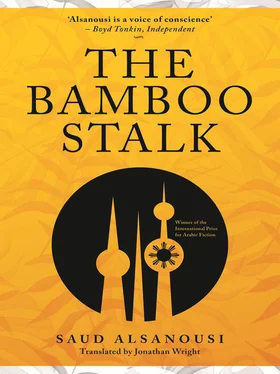I left through the back door, carrying the curse of Isa with me, so that good fortune could enter the house through the front door. My mother had an appointment to meet the family of a man who wanted to marry Awatif, my eldest sister.
Josephine, there’s more to this than you imagine. I won’t keep playing a game when I don’t know the rules. I completed the divorce procedures a few hours before writing this letter. Believe me, this will be best for me and for you. As for Isa, I promise I won’t abandon him. I’ll take care of all his needs and I’ll send him whatever money he needs at the end of each month until the time comes when I can take him back. I promise I will do that when the time is right.
Rashid
Kuwait, September 1988
My mother cried when I read out the words ‘I completed the divorce procedures ’, despite the fact that she had read the letter years before and had married another man after Rashid. I cried too, but that was when I read about my grandmother saying ‘Mind you never bring that thing back here again .’
‘Why does Grandmother hate me, Mama?’ I asked. My mother was busy mopping up my tears with a handkerchief that was already soaked with her own.
‘As Jesus said, even prophets are strangers in their own country,’ she said.
‘So I’m a prophet?’ I asked her in surprise.
‘God alone knows,’ she said, looking away towards the window.
Frightened, I took her hands. ‘Mama, if I grow up and go to my father’s country as a prophet, won’t they crucify me there?’ I asked.
She hugged me tight and laughed. ‘It was the Son of God that was crucified. Don’t worry. They won’t crucify you for being the son of Rashid,’ she said.
Although he had let her down, Rashid still meant much to her.
7
My mother said she was stunned when she read the letter for the first time, not because of the divorce, which was how she expected the relationship to end (‘The decision wasn’t your father’s. A whole society stood behind him,’ she said), but because she was afraid of his promise. She couldn’t imagine being able to give me up to my father under any circumstances. That was at the beginning, but when she thought about it hard, unemotionally, she realised that everyone in the Philippines dreamed of living abroad in a country that provided stability and a decent life. Women gave up everything to marry Western men who would take them off to their countries, for the sake of an opportunity to live well and have a family, but men found it hard to fulfil this dream. In the Philippines it’s the dream of every man and woman to emigrate and settle in Europe, America or Canada, giving up everything — their past, their country and even their family.
My mother realised that a secure future, of a kind rarely available to men, awaited me there in Kuwait, where the state provides citizens (and I was a citizen) with much more than even the most developed countries provide. My mother accepted my father’s promise, expected it to be fulfilled and prepared me for it. Although he had let her down and abandoned her by divorcing her, she would still say, ‘I never loved anyone as much as your father.’ Despite that love, about two years later my mother married Alberto. He was about ten years older than her and he lived in our neighbourhood. He worked on merchant ships and sailed the oceans for eight months a year. He spent the other months with her in his little house near my grandfather’s land. My mother had a better life with her new husband and when he was in the Philippines she left me in the care of my Aunt Aida. My mother almost went back to work as a servant in the Gulf at about this time so that she could secure her own future and that of her new husband, but she dropped the idea after my father intervened.
In a letter he sent more than two years after we left, he wrote:
Dear Josephine,
How are you? And how is Isa?
I received your last letter and read what was in it. I hope that being married is not distracting you from bringing up the boy, and also that you’ll give up the idea of coming to work in the Gulf again. I’ll send you enough money so you won’t need to go abroad. Just stay close to Isa. I don’t want him to grow up separated from his mother. What his father has done is already quite enough.
In a few days I’m going to marry a nice girl, Iman, who loves me very much. She follows what I write and it’s good to have her read it. I’ve told her about our son and she didn’t object when I told her that he would come back to live with me once my three sisters have married. She’s going to move in and live with me in my mother’s house until things improve and we can go and live in a new house and start our own family.
Keep well, you and Isa,
Rashid
Kuwait, May 1990
At first it was my mother who asked me to read my father’s letters to her, but then his letters started to get me interested and I asked her to show me more of them.
‘I don’t have any more, José,’ she replied, putting the letters back in the briefcase. ‘He stopped sending letters and the money transfers stopped after that letter because of the war over Kuwait.’
8
My grandfather began to hate me. When my father’s transfers stopped arriving, he no longer bothered to hide his feelings towards me. ‘You’ll settle down in Alberto’s house one day,’ he told my mother, ‘and I don’t want that boy staying here.’ But Aida stepped in. ‘I’ll look after him,’ she said, silencing my grandfather.
When the money stopped coming it had a big effect on Mendoza, although he still had a faint hope that the war would soon end and the monthly transfers would resume. But deep down he doubted this would ever happen.
‘I hope he doesn’t go missing in the war,’ he said, addressing no one in particular, while my mother rapped her knuckles on the wooden part of the sofa for good luck.
‘Or the war doesn’t drive him crazy,’ Mendoza added.
It was an implicit admission on the part of Mendoza, who had experience of war, a suggestion that his own mind was disturbed.
‘War’s like that,’ he added.
He wasn’t talking to anyone in particular. He was staring blankly as if looking at mental images of his own.
‘War isn’t just the fighting on the battlefield,’ he continued, ‘but also the war that’s fought in the minds of those who take part. The first ends, the second goes on and on.’
His eyes were frozen still. My mother said his eyes glistened as if he was about to cry. He turned his face towards the door and headed towards his house next door. He shook his head and said in a low voice, ‘That man will never come back, never come back.’
My mother said that before he went out, she heard three knocks on the wooden door that led outside.
9
The war in Kuwait ended in February 1991 but even then no letter arrived from my father. My mother called my grandmother’s house several times but all she received was insults and shouts, and then the usual tone you get when the line is disconnected. She asked women working in Kuwait to look out for any news of my father but nothing came of that. She asked after him in the Kuwaiti embassy in Manila but there was no response from the people working there. She waited a long time, but he seemed to have disappeared.
The first person to gloat, my mother said, was Aunt Aida.
‘All men are like that. They’re all bastards,’ she said.
From that day on my mother would reply with her favourite expression: ‘Except Rashid.’
The days passed, but my mother’s faith that I would go back to Kuwait one day never wavered, even when no letters or news of him arrived.
Читать дальше












